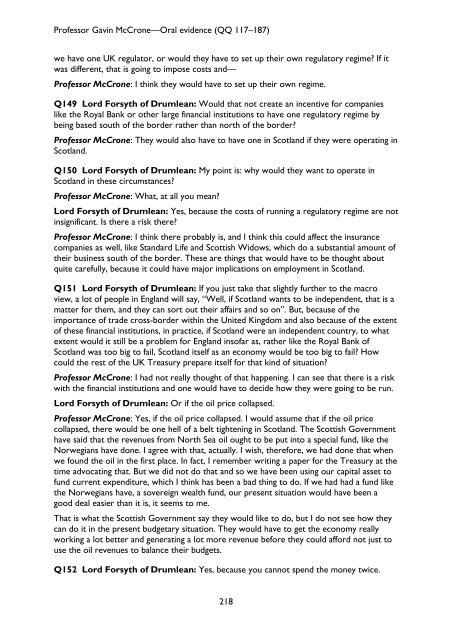SELECT COMMITTEE ON ECONOMIC AFFAIRS - Parliament
SELECT COMMITTEE ON ECONOMIC AFFAIRS - Parliament
SELECT COMMITTEE ON ECONOMIC AFFAIRS - Parliament
Create successful ePaper yourself
Turn your PDF publications into a flip-book with our unique Google optimized e-Paper software.
Professor Gavin McCrone—Oral evidence (QQ 117–187)<br />
we have one UK regulator, or would they have to set up their own regulatory regime? If it<br />
was different, that is going to impose costs and—<br />
Professor McCrone: I think they would have to set up their own regime.<br />
Q149 Lord Forsyth of Drumlean: Would that not create an incentive for companies<br />
like the Royal Bank or other large financial institutions to have one regulatory regime by<br />
being based south of the border rather than north of the border?<br />
Professor McCrone: They would also have to have one in Scotland if they were operating in<br />
Scotland.<br />
Q150 Lord Forsyth of Drumlean: My point is: why would they want to operate in<br />
Scotland in these circumstances?<br />
Professor McCrone: What, at all you mean?<br />
Lord Forsyth of Drumlean: Yes, because the costs of running a regulatory regime are not<br />
insignificant. Is there a risk there?<br />
Professor McCrone: I think there probably is, and I think this could affect the insurance<br />
companies as well, like Standard Life and Scottish Widows, which do a substantial amount of<br />
their business south of the border. These are things that would have to be thought about<br />
quite carefully, because it could have major implications on employment in Scotland.<br />
Q151 Lord Forsyth of Drumlean: If you just take that slightly further to the macro<br />
view, a lot of people in England will say, “Well, if Scotland wants to be independent, that is a<br />
matter for them, and they can sort out their affairs and so on”. But, because of the<br />
importance of trade cross-border within the United Kingdom and also because of the extent<br />
of these financial institutions, in practice, if Scotland were an independent country, to what<br />
extent would it still be a problem for England insofar as, rather like the Royal Bank of<br />
Scotland was too big to fail, Scotland itself as an economy would be too big to fail? How<br />
could the rest of the UK Treasury prepare itself for that kind of situation?<br />
Professor McCrone: I had not really thought of that happening. I can see that there is a risk<br />
with the financial institutions and one would have to decide how they were going to be run.<br />
Lord Forsyth of Drumlean: Or if the oil price collapsed.<br />
Professor McCrone: Yes, if the oil price collapsed. I would assume that if the oil price<br />
collapsed, there would be one hell of a belt tightening in Scotland. The Scottish Government<br />
have said that the revenues from North Sea oil ought to be put into a special fund, like the<br />
Norwegians have done. I agree with that, actually. I wish, therefore, we had done that when<br />
we found the oil in the first place. In fact, I remember writing a paper for the Treasury at the<br />
time advocating that. But we did not do that and so we have been using our capital asset to<br />
fund current expenditure, which I think has been a bad thing to do. If we had had a fund like<br />
the Norwegians have, a sovereign wealth fund, our present situation would have been a<br />
good deal easier than it is, it seems to me.<br />
That is what the Scottish Government say they would like to do, but I do not see how they<br />
can do it in the present budgetary situation. They would have to get the economy really<br />
working a lot better and generating a lot more revenue before they could afford not just to<br />
use the oil revenues to balance their budgets.<br />
Q152 Lord Forsyth of Drumlean: Yes, because you cannot spend the money twice.<br />
218

















